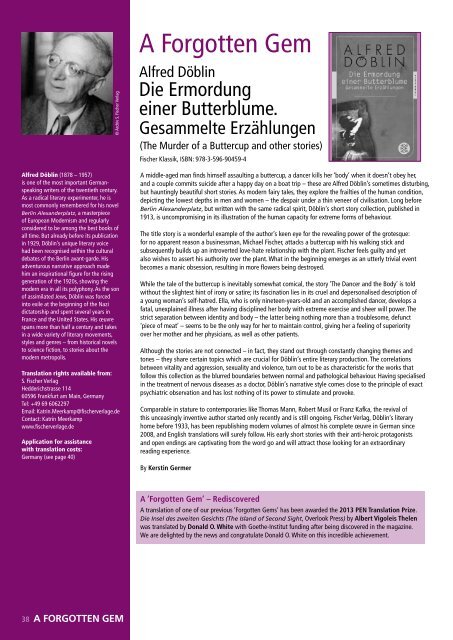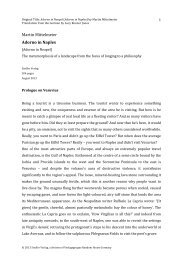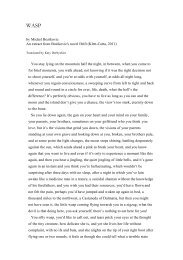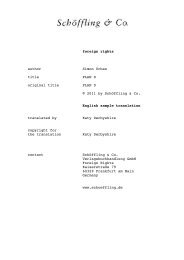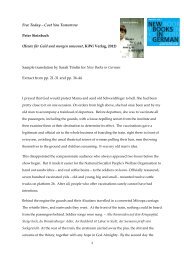issue 34 - New Books in German
issue 34 - New Books in German
issue 34 - New Books in German
You also want an ePaper? Increase the reach of your titles
YUMPU automatically turns print PDFs into web optimized ePapers that Google loves.
A Forgotten Gem<br />
Alfred Döbl<strong>in</strong> (1878 – 1957)<br />
is one of the most important <strong>German</strong>speak<strong>in</strong>g<br />
writers of the twentieth century.<br />
As a radical literary experimenter, he is<br />
most commonly remembered for his novel<br />
Berl<strong>in</strong> Alexanderplatz, a masterpiece<br />
of European Modernism and regularly<br />
considered to be among the best books of<br />
all time. But already before its publication<br />
<strong>in</strong> 1929, Döbl<strong>in</strong>’s unique literary voice<br />
had been recognised with<strong>in</strong> the cultural<br />
debates of the Berl<strong>in</strong> avant-garde. His<br />
adventurous narrative approach made<br />
him an <strong>in</strong>spirational figure for the ris<strong>in</strong>g<br />
generation of the 1920s, show<strong>in</strong>g the<br />
modern era <strong>in</strong> all its polyphony. As the son<br />
of assimilated Jews, Döbl<strong>in</strong> was forced<br />
<strong>in</strong>to exile at the beg<strong>in</strong>n<strong>in</strong>g of the Nazi<br />
dictatorship and spent several years <strong>in</strong><br />
France and the United States. His œuvre<br />
spans more than half a century and takes<br />
<strong>in</strong> a wide variety of literary movements,<br />
styles and genres – from historical novels<br />
to science fiction, to stories about the<br />
modern metropolis.<br />
Translation rights available from:<br />
S. Fischer Verlag<br />
Hedderichstrasse 114<br />
60596 Frankfurt am Ma<strong>in</strong>, <strong>German</strong>y<br />
Tel: +49 69 6062297<br />
Email: Katr<strong>in</strong>.Meerkamp@fischerverlage.de<br />
Contact: Katr<strong>in</strong> Meerkamp<br />
www.fischerverlage.de<br />
Application for assistance<br />
with translation costs:<br />
<strong>German</strong>y (see page 40)<br />
© Archiv S. Fischer Verlag<br />
Alfred Döbl<strong>in</strong><br />
Die Ermordung<br />
e<strong>in</strong>er Butterblume.<br />
Gesammelte Erzählungen<br />
(The Murder of a Buttercup and other stories)<br />
Fischer Klassik, ISBN: 978-3-596-90459-4<br />
A middle-aged man f<strong>in</strong>ds himself assault<strong>in</strong>g a buttercup, a dancer kills her ‘body’ when it doesn’t obey her,<br />
and a couple commits suicide after a happy day on a boat trip – these are Alfred Döbl<strong>in</strong>’s sometimes disturb<strong>in</strong>g,<br />
but haunt<strong>in</strong>gly beautiful short stories. As modern fairy tales, they explore the frailties of the human condition,<br />
depict<strong>in</strong>g the lowest depths <strong>in</strong> men and women – the despair under a th<strong>in</strong> veneer of civilisation. Long before<br />
Berl<strong>in</strong> Alexanderplatz, but written with the same radical spirit, Döbl<strong>in</strong>’s short story collection, published <strong>in</strong><br />
1913, is uncompromis<strong>in</strong>g <strong>in</strong> its illustration of the human capacity for extreme forms of behaviour.<br />
The title story is a wonderful example of the author’s keen eye for the reveal<strong>in</strong>g power of the grotesque:<br />
for no apparent reason a bus<strong>in</strong>essman, Michael Fischer, attacks a buttercup with his walk<strong>in</strong>g stick and<br />
subsequently builds up an <strong>in</strong>troverted love-hate relationship with the plant. Fischer feels guilty and yet<br />
also wishes to assert his authority over the plant. What <strong>in</strong> the beg<strong>in</strong>n<strong>in</strong>g emerges as an utterly trivial event<br />
becomes a manic obsession, result<strong>in</strong>g <strong>in</strong> more flowers be<strong>in</strong>g destroyed.<br />
While the tale of the buttercup is <strong>in</strong>evitably somewhat comical, the story ‘The Dancer and the Body’ is told<br />
without the slightest h<strong>in</strong>t of irony or satire; its fasc<strong>in</strong>ation lies <strong>in</strong> its cruel and depersonalised description of<br />
a young woman’s self-hatred. Ella, who is only n<strong>in</strong>eteen-years-old and an accomplished dancer, develops a<br />
fatal, unexpla<strong>in</strong>ed illness after hav<strong>in</strong>g discipl<strong>in</strong>ed her body with extreme exercise and sheer will power. The<br />
strict separation between identity and body – the latter be<strong>in</strong>g noth<strong>in</strong>g more than a troublesome, defunct<br />
‘piece of meat’ – seems to be the only way for her to ma<strong>in</strong>ta<strong>in</strong> control, giv<strong>in</strong>g her a feel<strong>in</strong>g of superiority<br />
over her mother and her physicians, as well as other patients.<br />
Although the stories are not connected – <strong>in</strong> fact, they stand out through constantly chang<strong>in</strong>g themes and<br />
tones – they share certa<strong>in</strong> topics which are crucial for Döbl<strong>in</strong>’s entire literary production. The correlations<br />
between vitality and aggression, sexuality and violence, turn out to be as characteristic for the works that<br />
follow this collection as the blurred boundaries between normal and pathological behaviour. Hav<strong>in</strong>g specialised<br />
<strong>in</strong> the treatment of nervous diseases as a doctor, Döbl<strong>in</strong>’s narrative style comes close to the pr<strong>in</strong>ciple of exact<br />
psychiatric observation and has lost noth<strong>in</strong>g of its power to stimulate and provoke.<br />
Comparable <strong>in</strong> stature to contemporaries like Thomas Mann, Robert Musil or Franz Kafka, the revival of<br />
this unceas<strong>in</strong>gly <strong>in</strong>ventive author started only recently and is still ongo<strong>in</strong>g. Fischer Verlag, Döbl<strong>in</strong>’s literary<br />
home before 1933, has been republish<strong>in</strong>g modern volumes of almost his complete œuvre <strong>in</strong> <strong>German</strong> s<strong>in</strong>ce<br />
2008, and English translations will surely follow. His early short stories with their anti-heroic protagonists<br />
and open end<strong>in</strong>gs are captivat<strong>in</strong>g from the word go and will attract those look<strong>in</strong>g for an extraord<strong>in</strong>ary<br />
read<strong>in</strong>g experience.<br />
By Kerst<strong>in</strong> Germer<br />
A ‘Forgotten Gem’ – Rediscovered<br />
A translation of one of our previous ‘Forgotten Gems’ has been awarded the 2013 PEN Translation Prize.<br />
Die Insel des zweiten Gesichts (The Island of Second Sight, Overlook Press) by Albert Vigoleis Thelen<br />
was translated by Donald O. White with Goethe-Institut fund<strong>in</strong>g after be<strong>in</strong>g discovered <strong>in</strong> the magaz<strong>in</strong>e.<br />
We are delighted by the news and congratulate Donald O. White on this <strong>in</strong>credible achievement.<br />
38 A forgotten gem


